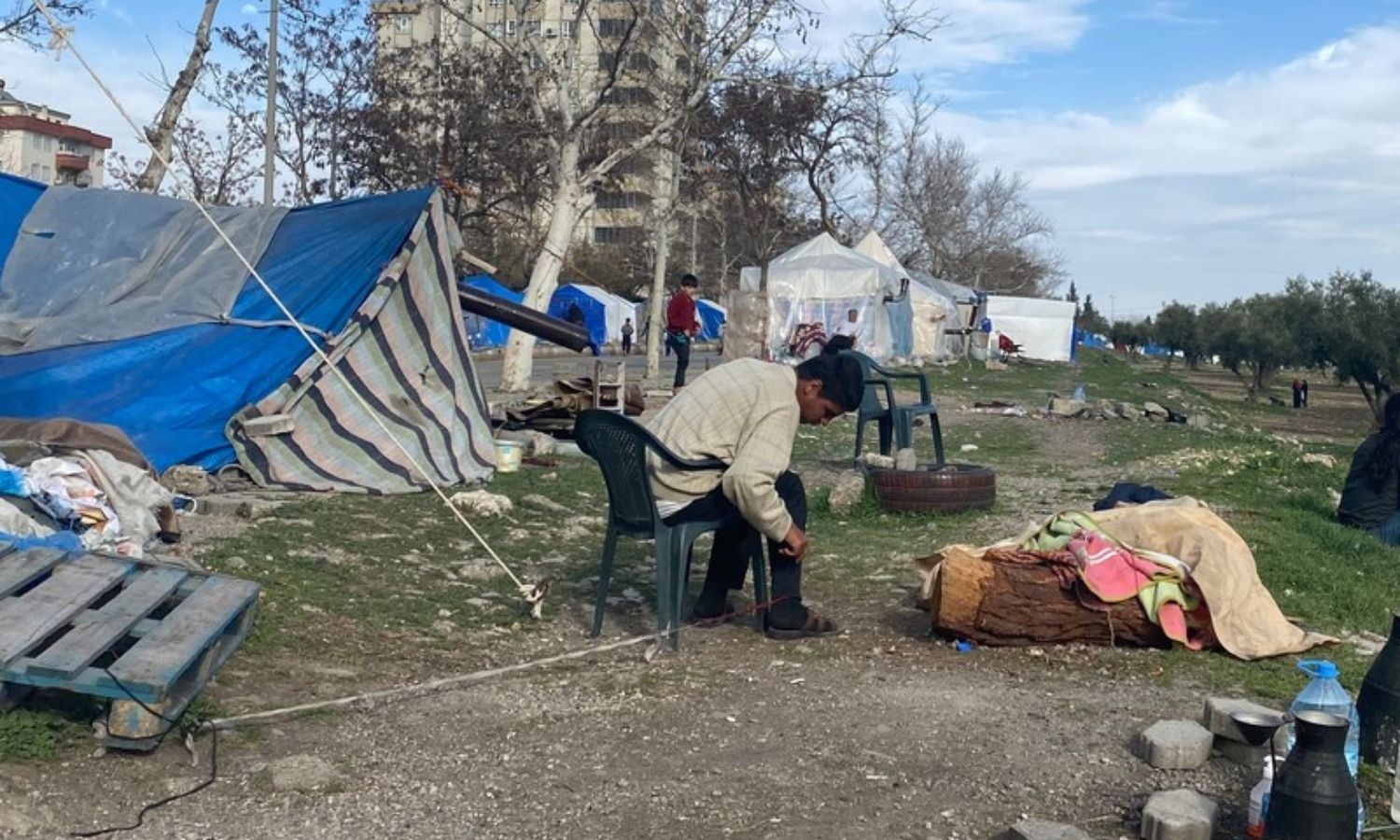



Since the earthquake that struck southern Turkey and northern Syria on February 6, 2023, the phenomenon of setting up makeshift camps on agricultural lands on the outskirts of cities or within parks in the southern Turkish provinces has spread, accommodating Turks and Syrian refugees who have not had the opportunity to move to other cities.
After the closure of many camps previously established by Turkey, where Syrian refugees resided, the authorities began closing them in 2023.
More than a month ago, Syrian families residing in scattered makeshift tents in the Kırıkhan area of Hatay received eviction notices, urging them to move to housing as rental prices in the area soared “exorbitantly” after the earthquake, according to testimonies obtained by Enab Baladi.
In five Turkish provinces, there are six camps hosting Syrian refugees under “temporary protection,” namely: Hatay, Kahramanmaraş, Osmaniye, Malatya, and Adana, where more than 57,000 refugees reside, according to official statistics issued by the Turkish Presidency of Migration Management.
Enab Baladi monitored a situation via social media of Syrians in the Kırıkhan area looking for homes to rent after being warned several times to vacate the tents they inhabit.
Khadija al-Haka, originally from the city of Hama, told Enab Baladi that the police and Turkish border guards (Gendarmerie) informed families living in makeshift tents in the area to evacuate them as soon as possible without specifying a deadline.
Al-Haka explained that the reason for the repeated warnings over the past month was the disturbance and noise caused by the families, leading to complaints from residents in buildings, according to what the police told the families.
Al-Haka is not alone; there are more than 50 tents in a makeshift camp where she resides in a public park in the Cumhuriyet Street in Kırıkhan, housing Syrian families affected by the earthquake due to the total or partial destruction of their homes.
This makeshift camp is one of several scattered around the city, with the exact number not officially announced.
In another camp in the same area, Turkish police warnings to evacuate the camp have continued for more than a month, amid reports that the complaints received have begun to exceed their capacity to manage the complainants.
This led to a significant number of families evacuating their tents, leaving them with options either to stay with relatives until they find a house or rent a house, even at high prices in a building damaged by the earthquake.
Following the devastating earthquake that struck southern Turkey, several homeowners raised their monthly rents, exploiting the displacement caused by the disaster and the large number of homes destroyed.
Fatim Jabro Hola, in her forties from Halfaya in rural Hama, works in agriculture to support her earthquake-affected family. However, her financial capacity is insufficient to cover living expenses and pay rents that are no less than 7,000 Turkish liras (1 USD equals 30 Turkish liras).
The notice to evacuate the tent in Kırıkhan city was a shock to Hola’s family of four, especially since houses are not available and the financial capacity of most tent residents is known to be low after losing most of their belongings.
As for Khadija al-Haka, she lost her husband after the earthquake and is trying to find a house at a price she can afford to register her residency if she rents it. However, restrictions imposed on Syrians add burdens to their lives.
According to al-Haka, most of the families in the camp have left, with only three families unable to rent due to residence registration restrictions.
In January 2024, the administration of the Abaydin camp in the city of Hatay, southern Turkey, presented options to families residing in the camp to vacate it. It housed Syrian refugee families affected by the earthquake.
The Turkish authorities closed two camps in Gaziantep and Kilis cities during 2023, known as the Nizip and el-Beyli camps, which hosted about nine thousand Syrian refugees. Their registration numbers in the camps were removed after their closure.
The method of closing the camps was similar to the options presented to families in the Abaydin camp. Refugees who wanted to move to Turkish states, excluding Istanbul, were given 6,500 Turkish liras, while the amount offered for those wishing to return voluntarily to Syria was 14,000 Turkish liras.
The decision to close the camps for Syrian refugees in Turkey is a continuation of earlier decisions made in 2018 about closing the camps, a routine matter by the Turkish Presidency of Migration Management and has been followed for years.
The Turkish Presidency of Migration Management has closed approximately 19 camps out of 25, with a previous plan to keep some for people with disabilities, according to an earlier statement by Jalal Demir, head of the Arab Media House in Turkey, to Enab Baladi.
Demir continued that the reason for not closing the remaining camps in previous periods was due to the earthquake that struck northern Syria and southern Turkey on February 6, 2023, in addition to presidential elections, economic reasons, and administrative changes, which led to the Presidency of Migration Management not rushing the closure decision.
The number of Syrian refugees under the temporary protection system in Turkey is three million and 116 thousand and 713 individuals, with 258 thousand and 643 Syrian refugees living in Hatay city alone.
if you think the article contain wrong information or you have additional details Send Correction